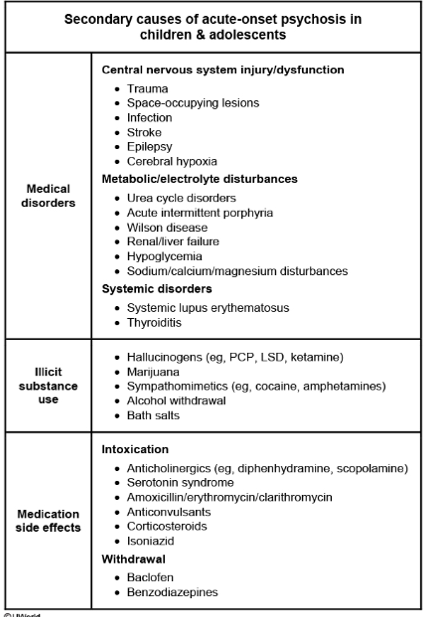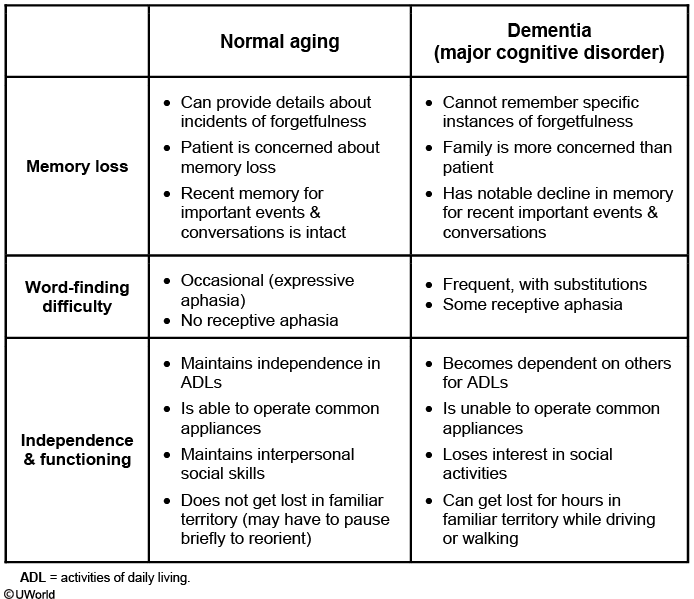Dementia Delirium
Amnesia
Retrograde Amnesia: An inability to recall previously formed memories. Typically, the lost memories are those that occurred before a CNS insult.
Anterograde Amnesia: An inability to form new memories, typically after a CNS insult.
Korsakoff’s Amnesia: Form of anterograde amnesia (and if severe, retrograde amnesia as well) that is caused by thiamine deficiency.
Chronic insult leads to bilateral destruction of the mammillary bodies.
Korsakoff's amnesia is classically seen in alcoholics and associated with confabulations.
Dissociative amnesia is an inability to recall memories due to psychiatric dissociation, usually surrounding a stressful event. The classic description is a patient who has completely intact memory except amnesia of a traumatic rape experience.
Transient Global Amnesia: Sudden onset of complete anterograde amnesia and pronounced retrograde amnesia; however, there is preservation of memory for personal identity (contrast this to dissociative amnesia).
Delirium
Delirium is a disorder of impaired cognitive functioning with a hallmark of waxing and waning level of consciousness.
(DeliRIUM = changes in sensoRIUM)
Delirium often is characterized by visual hallucinations, which are rare in dementia.
Delirium usually has an abnormal EEG, which distinguishes it from dementia.
Delirium is the most common psychiatric condition in patients treated in medical hospital units.
Causes of delirium (AEIOU TIPS):
Alcohol
Electrolytes
Iatrogenic (anticholinergics, anticonvulsants, antihypertensives, anti-Parkinson drugs, antibiotics, benzodiazepines, disulfiram, H2 receptor blockers, hypoglycemics, insulin, narcotics, NSAIDs, steroids)
Oxygen hypoxia (bleeding, pulmonary disease, carbon monoxide poisoning)
Uremia and hepatic encephalopathy
Trauma
Infection (especially urinary tract infection)
Poisons
Seizures (post-ictal)
The 1st line treatment of delirium is antipsychotics. The underlying cause must be treated as well after acute stabilization. (Note: The only type of delirium treated by benzodiazepines is delirium tremens!)

Dementia
Dementia is a disorder of impaired memory and gradual decrease in cognitive functions. The hallmark characteristic is cognitive deficit with normal consciousness.
(DeMEntia = MEmory loss)
Dementia usually has an insidious onset, while delirium has an acute onset.
Delirium is typically reversible, while dementia is most often not.
The most common type of dementia is Alzheimer disease. It is a clinical diagnosis that can only be truly confirmed after death by autopsy.
Vascular dementia is characterized by focal neurological deficits.
Pick disease is characterized by pronounced personality changes and inappropriate behavior.
Lewy body dementia is characterized by Lewy bodies in the cortex (as opposed to being confined to the substantia nigra in Parkinson's). Consider Lewy body dementia when the patient experiences visual hallucinations and Parkinsonism (resting tremor, bradykinesia, etc.).
Normal Pressure Hydrocephalus
A potentially reversible cause of dementia. Suspect it when a patient also has ataxia and incontinence.,
Creutzfeldt-jakob
Creutzfeldt-Jakob disease is caused by the α-helix to β-pleated sheet conformational change of prion protein (PrP). [This is often written as PrPc (α-helix) → PrPsc (β-pleated sheet)]. The PrPsc isoform of the protein is resistant to digestion by proteases, which leads to its accumulation in the CNS.
Presents as rapidly progressive (weeks to months) dementia and myoclonus (sudden uncontrolled muscle jerks) that can be elicited by a startle.,
The key histological finding in Creutzfeldt-Jakob disease is spongiform vacuolation of the cerebral cortex.
EEG shows periodic synchronous triphasic sharp wave complexes.,
Most patients with Creutzfeldt-Jakob disease die within 1 year of the onset of symptoms.
Dementia vs aging

Treatment of dementia involves ruling out reversible causes like normal pressure hydrocephalus and pseudodementia. Central acetylcholinesterase inhibitors (e.g. donepezil, galantamine, and rivastigmine) may be used to slow cognitive decline, but ultimately cannot reverse or stop the disease.
Geriatric Psychology
Major depressive disorder (MDD) is the most common psychiatric disorder in the elderly.
Patients who experience depression following a myocardial infarction have an increased rate of death compared with patients who do not experience depression following MI.
Pseudodementia
Pseudodementia is a presentation of major depressive disorder in the elderly characterized by symptoms of reduced cognitive function. These cognitive deficits mimic dementia.
If the depression is treated, the cognitive deficits are reversed.
A way to distinguish dementia and pseudodementia in a clinical setting: Patients with dementia will confabulate and guess at answers they do not know, while patients with pseudodementia demonstrate a lack of effort (e.g. "I don't know", etc.)
Avoid benzodiazepines in elderly patients. For an acutely agitated/delirious elderly patient, use antipsychotics (e.g.haloperidol).
decreased total sleep time
decreased REM, decreased/absent N4
increased sleep latency
frequent interruptions in all stages of sleep/nocturnal awakenings
peak sleepiness earlier in the evening
reduced sleep during early morning hours
daytime napping/reduced daytime sleep latency
Due to these changes, elderly patients may complain of difficulty falling asleep and/or maintaining sleep.
Due to decreased renal and hepatic function, the elderly are more susceptible to pharmacological side effects. Medications have increased potency (lower doses have the same efficacy) in elderly patients.
Orientation
Orientation is the ability of a patient to know who she or he is, what date and time it is, and what his or her present location and circumstance are. The order of loss of orientation is as follows:
1st time → 2nd place → 3rd person
Anosognosia
A condition in which a person following brain injury seems unaware of or denies the existence of the disability.,
Autotopagnosia
usually due to a lesion in the left parietal lobe
an inability to localize and orient different parts of the body.,
Last updated